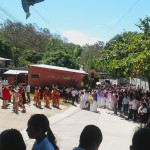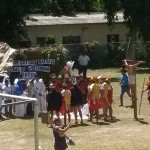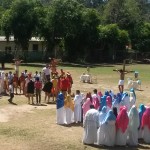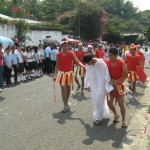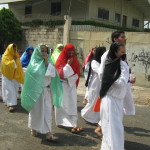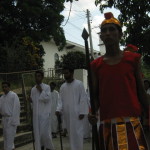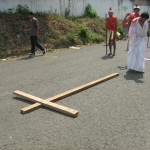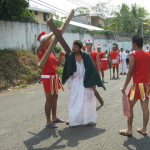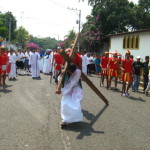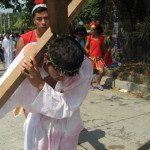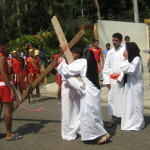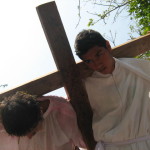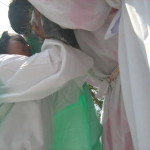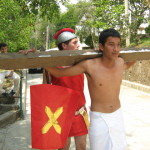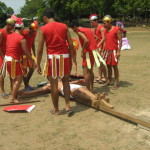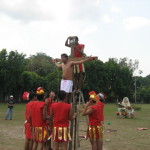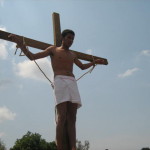Each year, COAR’s school works with the local Parish (Our Lady of the Pillar) to lead the Stations of the Cross (Via Crucis). It is truly a community event drawing upon students, COAR residents, parents, parishoners and even our wonderful nuns who come from Spain and Peru originally.
In the US, our culture tends to focus primarily on Easter Sunday itself: the Easter bonnets, children in new suits and dresses, the Easter Bunny, Easter Church service followed by brunch with family, etc. Most people, at this time of year, wish each other a happy Easter. However, in El Salvador, Holy Week itself tends to be the central focus. The Stations of the Cross or Via Dolorosa is reenacted by COAR during Lent – usually on a Friday, sometime before Palm Sunday. Almost the entire country takes Holy Week off – as a full week of vacation. At COAR, most of our children are able to spend Holy Week with distant relatives or family friends. But, there are always 15-20 kids who have no family to care for them during this solemn week. So, just like at Christmas, COAR’s housemothers jump in and try to make COAR extra special for the holiday.
For readers who are less familiar with the Way of the Cross, it is an opportunity for the faithful to meditate and to make a pilgrimmage of prayer to reflect upon the suffering that Jesus endured at each stage. The Stations of the Cross probably originated with the pilgimages to Jerusalem around 1342 when the Franciscans were allowed to administer the Christian holy sites. However, they became much more common in western Europe in the 16th century as Franciscans built shrines modeled upon the original Via Crucis in Jerusalem. More recently, Pope John Paul II led Stations of the Cross at the Colosseum each Good Friday.
The stations are: Jesus is condemned to death; Jesus carries his cross; Jesus falls for the first time; Jesus meets his mother; Simon of Cyrene helps Jesus; Veronica wipes Jesus’ face; Jesus falls the 2nd time; Jesus meets the women of Jerusalem; Jesus falls the 3rd time; Jesus is stripped of his clothes; Jesus is nailed to the cross; Jesus is taken down from the cross; Jesus is laid in the tomb.
COAR was founded by a US Catholic Priest, first administered by a wonderful community of nuns based in Houston, and is now administered by the Archdiocese of San Salvador and has been funded since the beginning by (primarily) US donors through 2nd collections and small donations. El Salvador is a unique land where due to its history and the sacrifice of so many who were following Jesus’ teachings, Catholic Social Justice lives fully, richly and openly in the lives of the people. There are few places where the struggle for social change has been so rooted in Catholic Social Justice and the Gospels.

